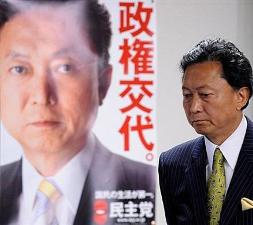 Fresh from a landslide election win, Japan’s next government faces signs of an emerging rift with big business, which fears some of its policies could hinder a recovery in the recession-hit economy.
Fresh from a landslide election win, Japan’s next government faces signs of an emerging rift with big business, which fears some of its policies could hinder a recovery in the recession-hit economy.
Premier-in-waiting Yukio Hatoyama has vowed to put the interests of people before those of corporate Japan. In a recent essay he criticised “unrestrained market fundamentalism and financial capitalism that are void of morals.”
His Democratic Party of Japan (DPJ) has irked major manufacturers with a goal to reduce greenhouse gas emissions by 25 percent by 2020.
The ambitious target compares with an eight-percent cut promised by the pro-business Liberal Democratic Party, which was swept from power in a landmark election Sunday after governing Japan almost continuously since 1955.
The head of the top business lobby, Nippon Keidanren, has called on the DPJ to review its emission reduction target, telling Japanese media on Thursday that it may be unrealistic and “a burden to the people.”
The lobby’s head Fujio Mitarai — chairman of high-tech giant Canon Inc. — urged the DPJ to consider the “effects on jobs” of the sweeping plan.
Japanese companies have long argued that tighter emission rules would hurt their ability to compete with global rivals, and the Japan Automobile Manufacturers Association has also spoken out against the plan.
“We are concerned about its feasibility given its impact on economic activities, effect on employment and significant burden on the Japanese people,” said Honda Motor chairman Satoshi Aoki, who heads the association.
The Federation of Electric Power Companies of Japan has described the target as “very tough” and asked the party to be more realistic.
Another bone of contention is the DPJ’s proposal to curb the use of temporary workers, who have borne the brunt of jobs cuts by companies struggling to cope with the worst recession in decades.
The party’s allies in the labour unions have accused Japanese companies of being too quick to fire contract workers, who played a key role keeping Japan’s plants and factories running before the economic crisis erupted.
After decades of cosy ties between the LDP and big business, Hatoyama’s DPJ has pledged to shift the focus to households with measures including cash allowances for families, an increased minimum wage, and petrol tax cuts.
Rather than raising taxes, the opposition proposes funding its measures by cutting wasteful government spending.
The DPJ has decided to freeze the unspent portion of the extra budget drawn up by the LDP for this fiscal year and divert the money to its own welfare programmes, the Yomiuri newspaper reported in its evening edition.
Analysts believe the DPJ’s proposed measures, worth a combined 16.8 trillion yen (177 billion yen) a year from 2012, could boost consumer spending — for long a weak link in the economy.
But some are worried that the party is abandoning free-market reforms they see as vital in order to tackle the massive public debt and boost productivity to cope with an ageing and shrinking population.
“The DPJ has failed to point to any clear policies related to job creation, industrial promotion, population problems, deregulation, policy finance methods and fiscal consolidation,” said Barclays Capital economist Kyohei Morita.
“This makes it difficult to see how the Japanese economy will develop over the long term.”
Experts say, however, that corporate Japan could benefit from assistance from the incoming government in areas such as electric cars and energy-efficient appliances.
The DPJ plan is likely to require individual firms to cut emission, but could also create new opportunities for companies with environmental technologies, said Yoko Monoe, an analyst at the Daiwa Institute of Research.




